AFI OMB Justification Package - Attachments - 8.7.12 - revised
AFI OMB Justification Package - Attachments - 8.7.12 - revised.docx
Assets for Independence (AFI) Program Evaluation
AFI OMB Justification Package - Attachments - 8.7.12 - revised
OMB: 0970-0414
SUPPORTING STATEMENT FOR THE
ASSETS FOR INDEPENDENCE (AFI)
PROGRAM EVALUATION
ATTACHMENTS
Office of Planning, Research, and Evaluation
Administration for Children and Families
U.S. Department of Health and Human Services
370 L'Enfant Promenade, SW
Washington, DC 20447
Contract Number HHSP23320095654WC
Order Number HHSP23337032T
October 2012
Table of Contents
ATTACHMENT A Federal-Wide Assurance
ATTACHMENT B Confidentiality Agreement
ATTACHMENT C Minimum Detectable Effect
ATTACHMENT D Site Management Screens
ATTACHMENT E Informed Consent
ATTACHMENT F Panel Maintenance Mailing Materials
ATTACHMENT G Field Locating Materials
ATTACHMENT H Lead Letter and Q&A Brochure
ATTACHMENT I Follow-Up Survey Introduction
ATTACHMENT J 12-Month Follow-Up Survey Incentive Letter
ATTACHMENT K 60-Day Federal Register Notice
ATTACHMENT L References
Attachment A
Federal-Wide Assurance
SECTION 301 OF THE PUBLIC HEALTH SERVICE ACT (42 USC 241)
TITLE III – GENERAL POWERS AND DUTIES OF PUBLIC HEALTH SERVICE
PART A – RESEARCH AND INVESTIGATION
IN GENERAL
Sec. 301 [Sec. 241] (a) The Secretary shall conduct in the Service, and encourage, cooperate with, and render assistance to other appropriate public authorities, scientific institutions, and scientists in the conduct of, and promote the coordination of, research, investigations, experiments, demonstrations, and studies relating to the causes, diagnosis, treatment, control, and prevention of physical and mental diseases and impairments of man, including water purification, sewage treatment, and pollution of lakes and streams. In carrying out the foregoing the Secretary is authorized to -
collect and make available through publications and other appropriate means, information as to, and the practical application of, such research and other activities;
make available research facilities of the Service to appropriate public authorities, and to health officials and scientists engaged in special study;
make grants-in-aid to universities, hospitals, laboratories, and other public or private institutions, and to individuals for such research projects as are recommended by the advisory council to the entity of the Department supporting such projects and make, upon recommendation of the advisory council to the appropriate entity of the Department, grants-in-aid to public or nonprofit universities, hospitals, laboratories, and other institutions for the general support of their research;
secure from time to time and for such periods as he deems advisable, the assistance and advice of experts, scholars, and consultants from the United States or abroad;
for purposes of study, admit and treat at institutions, hospitals, and stations of the Service, persons not otherwise eligible for such treatment; make available, to health officials, scientists, and appropriate public and other nonprofit institutions and organizations, technical advice and assistance on the application of statistical methods to experiments, studies, and surveys in health and medical fields;
enter into contracts, including contracts for research in accordance with and subject to the provisions of law applicable to contracts entered into by the military departments under sections 2353 and 2354 of title 10, except that determination, approval, and certification required thereby shall be by the Secretary of Health and Human Services; and,
adopt, upon recommendations of the advisory councils to the appropriate entities of the Department or, with respect to mental health, the National Advisory Mental Health Council, such additional means as the Secretary considers necessary or appropriate to carry out the purposes of this section.
The Secretary may make available to individuals and entities, for biomedical and behavioral research, substances and living organisms. Such substances and organisms shall be made available under such terms and conditions (including payment for them) as the Secretary determines appropriate.
(b) (1) The Secretary shall conduct and may support through grants and contracts studies and testing of substances for carcinogenicity, teratogenicity, mutagenicity, and other harmful biological effects. In carrying out this paragraph, the Secretary shall consult with entities of the Federal Government, outside of the Department of Health and Human Services, engaged in comparable activities. The Secretary, upon request of such an entity and under appropriate arrangements for the payment of expenses, may conduct for such entity studies and testing of substances for carcinogenicity, teratogenicity, mutagenicity, and other harmful biological effects.
(2) (A) The Secretary shall establish a comprehensive program of research into the biological effects of low-level ionizing radiation under which program the Secretary shall conduct such research and may support such research by others through grants and contracts.
(B) The Secretary shall conduct a comprehensive review of Federal programs of research on the biological effects of ionizing radiation.
(3) The Secretary shall conduct and may support through grants and contracts research and studies on human nutrition, with particular emphasis on the role of nutrition in the prevention and treatment of disease and on the maintenance and promotion of health, and programs for the dissemination of information respecting human nutrition to health professionals and the public. In carrying out activities under this paragraph, the Secretary shall provide for the coordination of such of these activities as are performed by the different divisions within the Department of Health and Human Services and shall consult with entities of the Federal Government, outside of the Department of Health and Human Services, engaged in comparable activities. The Secretary, upon request of such an entity and under appropriate arrangements for the payment of expenses, may conduct and support such activities for such entity.
(4) The Secretary shall publish a biennial report which contains -
(A) a list of all substances ( i ) which either are known to be carcinogens or may reasonably be anticipated to be carcinogens and ( ii ) to which a significant number of persons residing in the United States are exposed;
(B) information concerning the nature of such exposure and the estimated number of persons exposed to such substances;
(C) a statement identifying (i) each substance contained in the list under subparagraph (A) for which no effluent, ambient, or exposure standard has been established by a Federal agency, and
(ii) for each effluent, ambient, or exposure standard established by a Federal agency with respect to a substance contained in the list under subparagraph (A), the extent to which, on the basis of available medical, scientific, or other data, such standard, and the implementation of such standard by the agency, decreases the risk to public health from exposure to the substance; and
(D) a description of (i) each request received during the year involved -
(I) from a Federal agency outside the Department of Health and Human Services for the Secretary, or
(II) from an entity within the Department of Health and Human Services to any other entity within the Department, to conduct research into, or testing for, the carcinogenicity of substances or to provide information described in clause (ii) of subparagraph (C), and (ii) how the Secretary and each such other entity, respectively, have responded to each such request.
(5) The authority of the Secretary to enter into any contract for the conduct of any study, testing, program, research, or review, or assessment under this subsection shall be effective for any fiscal year only to such extent or in such amounts as are provided in advance in appropriation Acts.
(c) The Secretary may conduct biomedical research, directly or through grants or contracts, for the identification, control, treatment, and prevention of diseases (including tropical diseases) which do not occur to a significant extent in the United States.
(d) Protection of privacy of individuals who are research subjects. The secretary may authorize persons engaged in biomedical, behavioral, clinical, or other research (including research on mental health, including research on the use and effect of alcohol and other psychoactive drugs) to protect the privacy of individuals who are the subject of such research by withholding from all persons not connected with the conduct of such research the names or other identifying characteristics of such individuals. Persons so authorized to protect the privacy of such individuals may not be compelled in any federal, state, or local civil, criminal, administrative, legislative, or other proceedings to identify such individuals
Attachment B
Confidentiality Agreement for Research Staff
CONFIDENTIALITY AGREEMENT
I, (print employee’s name), an employee of (print employee’s organization), agree to work on the Assets for Independence (AFI) Program Evaluation in accordance with the guidelines and restrictions specified below. I understand that compliance with the terms of this agreement is a condition of my assignment with the Assets for Independence (AFI) Program Evaluation and that these terms are supplementary to those listed in my contract of employment with
(print employee’s organization).
a. I agree to treat as confidential all case-specific information obtained in the Assets for Independence (AFI) Program Evaluation and related matters. I further agree that this covenant of confidentiality shall survive the termination of this agreement.
b. I further understand that failure to follow the guidelines below may result in a potential violation of the provisions of the Privacy Act of 1974 (violation of the Privacy Act is a misdemeanor and may subject the violator to a fine of up to $5,000), and potential Institute disciplinary action, including termination. To fulfill confidentiality obligations, I will:
1. Discuss confidential project information only with authorized employees of the Assets for Independence (AFI) Program Evaluation.
2. Store confidential project information as specified by project protocols.
3. Safeguard combinations, keys, and rooms that secure confidential project information.
4. Safeguard confidential project information when in actual use.
5. Immediately report any alleged violations of the security procedures to my immediate supervisor.
6. Not photocopy or record by any other means any confidential project information unless authorized by project leaders or my supervisor.
7. Not in any way compromise the confidentiality of project participants.
8. Not allow access to any confidential project information to any unauthorized person.
9. Report any lost or misplaced confidential project information to my supervisor immediately.
Employee’s Signature _____________________________Date __________________
Employee’s Organization _______________________________
Attachment C
Minimum Detectable Effects
Minimum Detectable Effects for Impact Estimates at Follow-up Month 12 |
|
|
|
||||||
(Total Sample: 500 and 600 Cases in Sites 1 and 2, Respectively |
|
|
|
||||||
|
|
|
|
|
|
|
|
|
|
|
|
|
|
|
|
|
|
|
|
|
|
|
|
|
|
||||
|
|
Site 1: |
Site 2: |
Pooled: |
|
|
|
|
|
Total sample (A and B) |
600 |
500 |
1,100 |
|
|
|
|
|
|
|
|
|
|
|
|
|
|
|
|
|
|
Number of cases at entry |
|
|
|
||||
A: Treatment |
|
300 |
250 |
550 |
|
|
|
|
|
|
|
|
|
|
|
|
|
|
|
|
|
|
|
|
|
|
|
|
|
|
|
|
|
|
|
|
|
|
|
B: Control |
|
300 |
250 |
550 |
|
|
|
|
|
|
|
|
|
|
|
|
|
|
|
|
|
Completed interviews: 85% |
|
|
|
||||
A: Treatment |
|
255 |
213 |
468 |
|
|
|
|
|
|
|
|
|
|
|
|
|
|
|
|
|
|
|
|
|
|
|
|
|
|
|
|
|
|
|
|
|
|
|
B: Control |
|
255 |
213 |
468 |
|
|
|
|
|
|
|
|
|
|
|
|
|
|
|
|
|
Minimum detectable effect* |
|
|
|
||||
Comparison: |
|
|
|
|
|
|
|
|
|
A versus B |
|
0.123 |
0.134 |
0.091 |
|
|
|
|
|
|
|
|
|
|
|
|
|
|
|
|
|
|
|
|
|
|
|
|
|
|
|
|
|
|
|
|
|
|
|
|
|
|
|
|
|
|
|
|
|
*Assumes 80 percent power, 5 percent significance (two-sided), Group B mean of 0.500. |
|
||||||||
|
|
||||||||
Attachment D
Site Management Screens
OMB
#: 0970-XXXX Expiration
Date: XX/XX/2015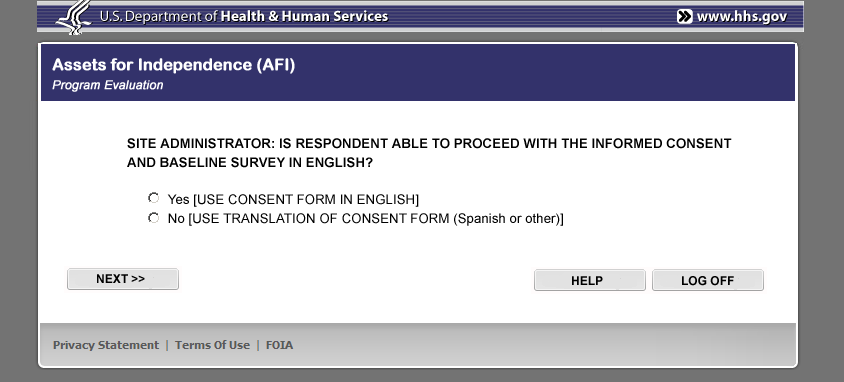
OMB
#: 0970-XXXX Expiration
Date: XX/XX/2015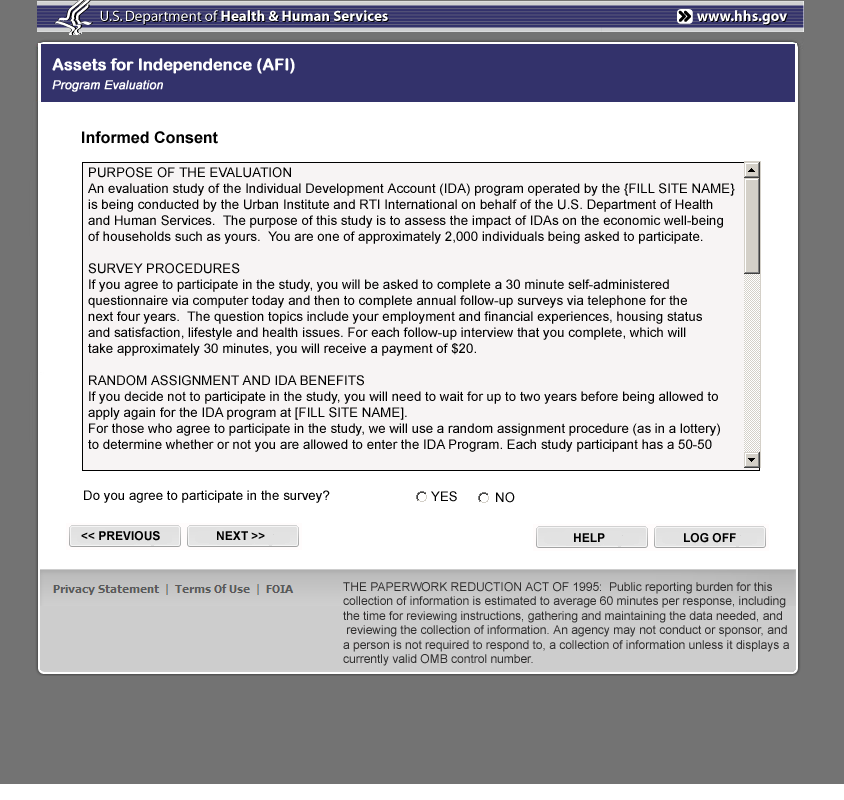
OMB
#: 0970-XXXX Expiration
Date: XX/XX/2015
OMB
#: 0970-XXXX Expiration
Date: XX/XX/2015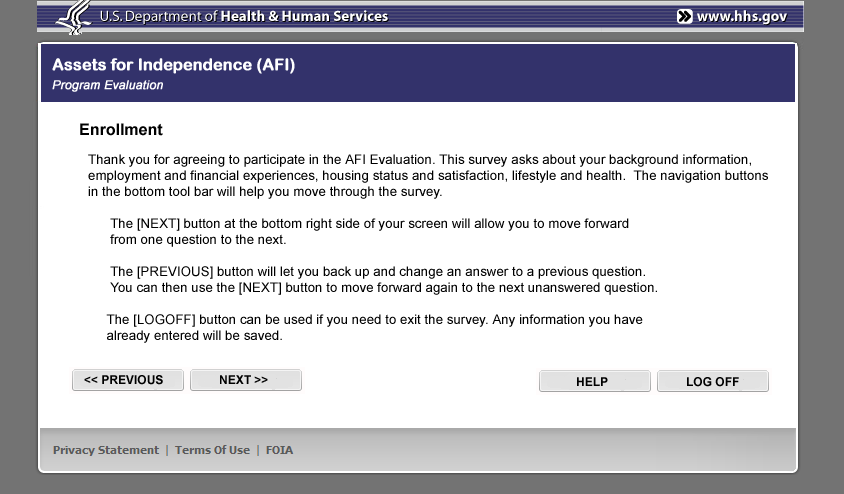
OMB
#: 0970-XXXX Expiration
Date: XX/XX/2015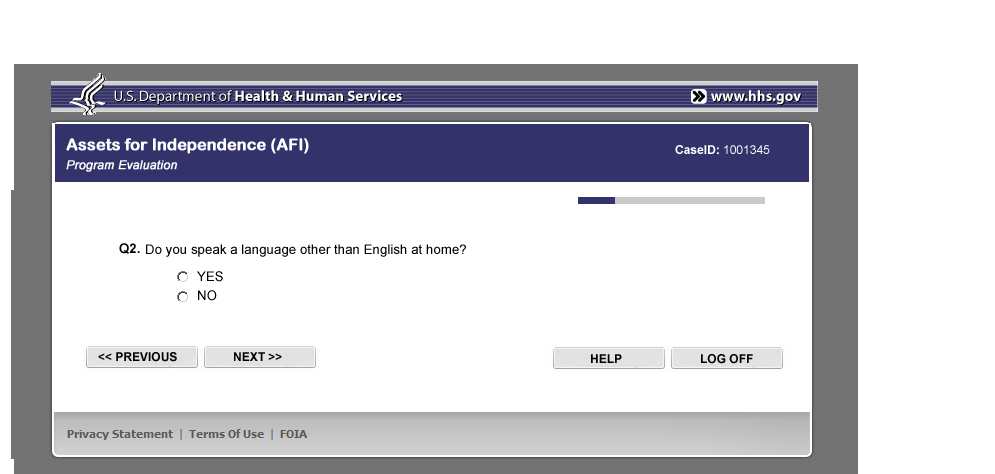
OMB
#: 0970-XXXX Expiration
Date: XX/XX/2015
Attachment E
Informed Consent
OMB #: 0970-XXXX
Expiration Date: XX/XX/2015
ASSETS FOR INDEPENDENCE (AFI)
PROGRAM EVALUATION
THE PAPERWORK REDUCTION ACT OF 1995: Public reporting burden
for this collection of information is estimated to average 30
minutes for the baseline and follow-up questionnaires, for a total
of 60 minutes per response, including the time for reviewing
instructions, gathering and maintaining the data needed, and
reviewing the collection of information. An agency may not conduct
or sponsor, and a person is not required to respond to, a collection
of information unless it displays a currently valid OMB control
number.
Consent form to participate
PURPOSE OF THE EVALUATION
An evaluation study of the Individual Development Account (IDA) program operated by the {FILL SITE NAME} is being conducted by the Urban Institute and RTI International on behalf of the U.S. Department of Health and Human Services. The purpose of this study is to assess the impact of IDAs on the economic well-being of households such as yours. You are one of approximately 1,100 individuals being asked to participate.
SURVEY PROCEDURES
If you agree to participate in the study, you will be asked to complete a 30 minute self-administered questionnaire via computer today and then to complete annual follow-up surveys via telephone for the next three years. The question topics include your employment and financial experiences, housing status and satisfaction, lifestyle and health issues. For each follow-up interview that you complete, which will take approximately 30 minutes, you will receive $20 as a token of appreciation.
RANDOM ASSIGNMENT AND IDA BENEFITS
If you decide not to participate in the study, you will need to wait for up to eighteen months before being allowed to apply again for the IDA program at [FILL SITE NAME].
For those who agree to participate in the study, we will use a random assignment procedure (like a lottery) to determine whether or not you are allowed to enter the IDA Program. Each study participant has a 50-50 chance of being allowed to enter the IDA Program, as a member of the study’s “treatment group.” Those not selected to enter the program can still receive any other benefits and services offered by [FILL SITE NAME], as a member of the study’s “control group.” You will be notified of your group assignment at the end of the computer interview today.
If you are selected for the [FILL SITE NAME] IDA Program, you will need to submit financial information, including information from your IDA account at the Bank of [FILL NAME] to the Urban Institute and RTI International for the purpose of this evaluation.
POTENTIAL RISKS AND DISCOMFORTS
In today’s computer questionnaire or in the annual follow-up surveys, you may find some of the questions to be personal. You may refuse to answer any question and you may take a break at any time during an interview.
POTENTIAL BENEFITS
There are no immediate program benefits or services provided to those completing today’s computer survey. For each annual follow-up survey that you complete, you will receive $20 as a token of appreciation. This evaluation may also generate support for government policies that offer resources to households such as yours for investment in long-term economic growth.
PRIVACY
All of the information you provide will be kept private to the extent permitted by law, and we will never publish, release, or share your personal information. Many precautions have been taken to protect your information. Information such as your name and address will be stored separately from the answers you provide on the online survey.
PARTICIPATION AND WITHDRAWAL
Your decision to take part in this study is completely voluntary. You can refuse any part of the program and you can stop participating at any time. You can refuse to answer any question in the computer survey or any follow-up survey. You will not be penalized in any way should you choose not to participate or withdraw. If you have any questions about the project, you may call Melissa Hobbs, the Data Collection Task Leader, at 1-800-334-8571, 25744. If you have any questions about your rights as a study participant, you may call the Administrator of the Institutional Review Board at the Urban Institute, at X (a toll-free number).
By agreeing to participate in this research, you are not giving up any of your legal rights.
The site administrator will record in the computer your decision about participation. We will also provide a copy of this consent form to you for your records.
__________________________________________ _____/____/____
Participant’s Signature Date (mo/day/yr)
__________________________________________
Participant’s Name (first and last name): Please Print
Attachment F
Panel Maintenance Mailing Materials
ASSETS FOR INDEPENDENCE (AFI) PROGRAM EVALUATION
PANEL MAINTENANCE LETTER
OMB #: 0970-XXXX
Expiration Date: XX/XX/2015
THE PAPERWORK REDUCTION ACT
OF 1995: Public reporting burden for this collection of
information is estimated to average 30 minutes for the baseline and
follow-up questionnaires, for a total of 60 minutes per response,
including the time for reviewing instructions, gathering and
maintaining the data needed, and reviewing the collection of
information. An agency may not conduct or sponsor, and a person is
not required to respond to, a collection of information unless it
displays a currently valid OMB control number.
[DATE]
[FIRST NAME] [LAST NAME]
[ADDRESS]
[CITY], [STATE] [ZIP]
Dear [FIRST NAME],
Several months ago, you applied for the Individual Development Account (IDA) program operated by the [FILL SITE NAME] and sponsored by the Department of Health and Human Services, Administration for Children and Families (ACF). At that time, you completed a survey on the computer.
We are now preparing for the next survey beginning in [FILL MONTH AND YEAR] which will be conducted by telephone. For this program to be successful, it is important that we interview as many people who completed the computer survey as we can.
We are writing you now to make sure that we have your correct address and telephone number. We have enclosed a postage-paid envelope and a form for you to fill out.
Please know that your decision to provide contact information will not affect any services you receive. All information you provide will be kept private to the extent permitted by law, so your name will not be associated with the research findings from this project.
Although your participation in the study is completely voluntary, your opinions and experiences are of great value. If you have any questions about the form or about the study, please call Melissa Hobbs, the Data Collection Task Leader, toll-free at 1-800-334-8571 ext. 25744.
Thank you for your help.
Sincerely,
Dr. Gregory Mills
Project Director
Assets for Independence (AFI) Program Evaluation
OMB #: 0970-XXXX Expiration
Date: XX/XX/2015 [FILL
SITE NAME] AFI
Program Evaluation Follow-up Study Contact
Information Update Form Please review and return this form
in the postage-paid envelope.
If your address
and telephone number are correct please check the “Contact
Information Correct” box. If your information has changed,
please cross through anything that is incorrect and write your new
information in the space below. If you plan to move and know your
new address and telephone number, please enter it in the space
below. If you plan to
move and do not know your new address and telephone number, please
provide an address or phone number that we can use to reach you.
For example, provide a work number or a cell phone number. CURRENT CONTACT
INFORMATION UPDATED CONTACT INFORMATION
[ID]
Best_R_Name
Best_R_addr
Best_R_city, Best_R_State, Best_R_zip5
TELEPHONE:Best_R_phone
CONTACT INFORMATION CORRECT
Thank You!
THE PAPERWORK REDUCTION ACT
OF 1995: Public reporting burden for this collection of
information is estimated to average 30 minutes for the baseline and
follow-up questionnaires, for a total of 60 minutes per response,
including the time for reviewing instructions, gathering and
maintaining the data needed, and reviewing the collection of
information. An agency may not conduct or sponsor, and a person is
not required to respond to, a collection of information unless it
displays a currently valid OMB control number.
Attachment G
Field Locating Materials
OMB #: 0970-XXXX
Expiration
Date: XX/XX/2015
THE PAPERWORK REDUCTION ACT OF
1995: Public reporting burden for this collection of
information is estimated to average 30 minutes for the baseline and
follow-up questionnaires, for a total of 60 minutes per response,
including the time for reviewing instructions, gathering and
maintaining the data needed, and reviewing the collection of
information. An agency may not conduct or sponsor, and a person is
not required to respond to, a collection of information unless it
displays a currently valid OMB control number.
OMB #: 0970-XXXX
Expiration
Date: XX/XX/2015
THE PAPERWORK REDUCTION ACT OF
1995: Public reporting burden for this collection of
information is estimated to average 30 minutes for the baseline and
follow-up questionnaires, for a total of 60 minutes per response,
including the time for reviewing instructions, gathering and
maintaining the data needed, and reviewing the collection of
information. An agency may not conduct or sponsor, and a person is
not required to respond to, a collection of information unless it
displays a currently valid OMB control number.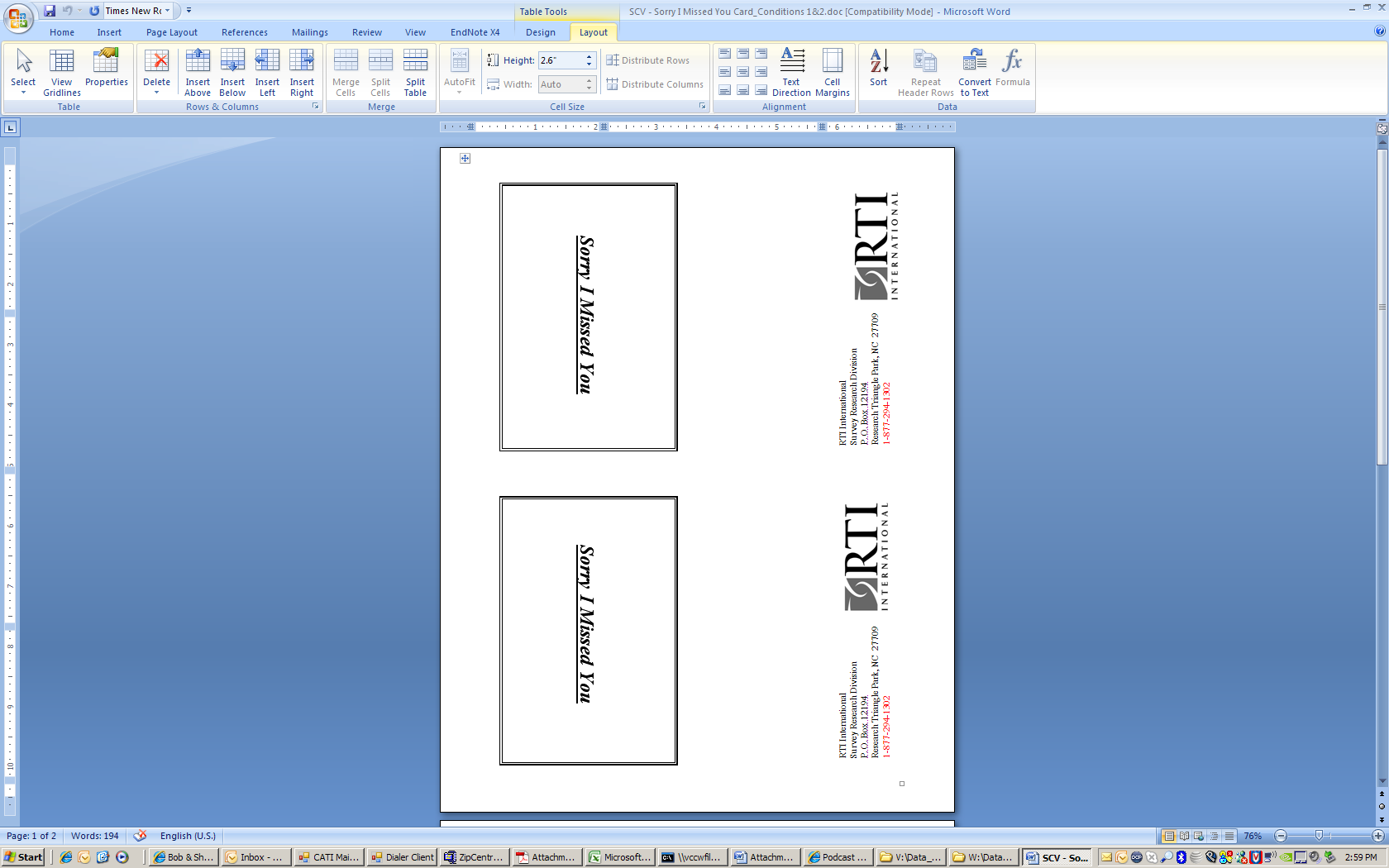
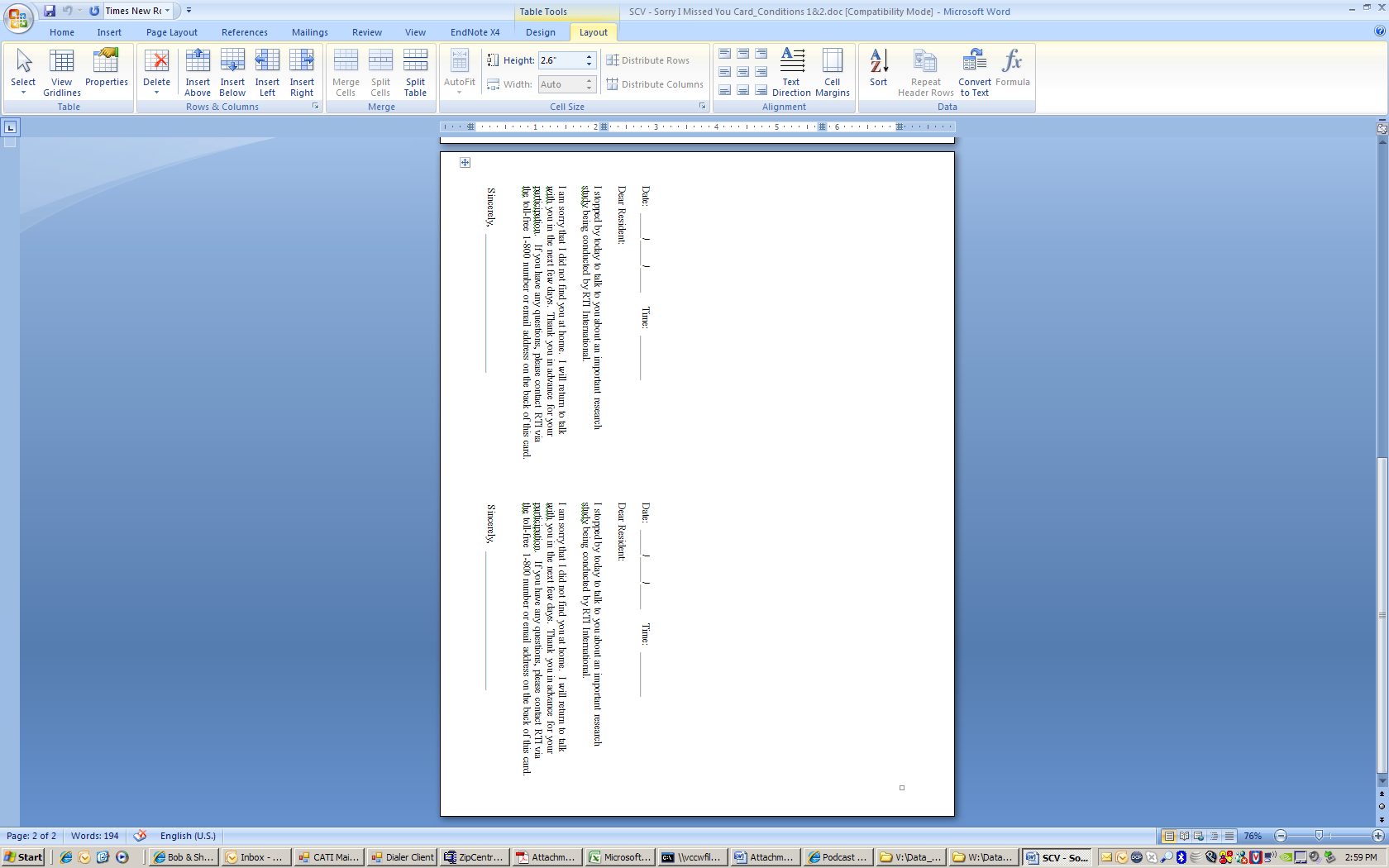
THE PAPERWORK REDUCTION ACT OF
1995: Public reporting burden for this collection of
information is estimated to average 30 minutes for the baseline and
follow-up questionnaires, for a total of 60 minutes per response,
including the time for reviewing instructions, gathering and
maintaining the data needed, and reviewing the collection of
information. An agency may not conduct or sponsor, and a person is
not required to respond to, a collection of information unless it
displays a currently valid OMB control number.
OMB #: 0970-XXXX
Expiration Date: XX/XX/2015
To whom it may concern:
This letter serves to authorize (FIELD LOCATOR NAME) to work as a field tracing representative on the Assets for Independence (AFI) Program Evaluation, sponsored by the Administration for Children and Families (ACF), an agency within the United States Department of Health and Human Services.
The field tracing representatives working on this study have been hired and trained specifically for this study by RTI International (RTI), a non-government survey organization located in Research Triangle Park, North Carolina. RTI is under contract (Contract # X) to ACF to perform all data collection activities associated with this survey.
If you would like further verification that (INTERVIEWER NAME) is a legitimate interviewer working for RTI on this study, please contact Ms. Melissa Hobbs at RTI (1-877-Xxx-xxxx, extension X, 8:30 AM to 5:00 PM, EST).
Thank you for your cooperation.
Sincerely,
Dr. Gregory Mills
Project Director
Assets for Independence (AFI) Program Evaluation
Attachment H
Lead Letter and Q&A Brochure
ASSETS FOR INDEPENDENCE (AFI) PROGRAM EVALUATION
12-MONTH FOLLOW-UP LEAD LETTER –
CONTROL AND TREATMENT GROUP
THE PAPERWORK REDUCTION ACT OF
1995: Public reporting burden for this collection of
information is estimated to average 30 minutes for the baseline and
follow-up questionnaires, for a total of 60 minutes per response,
including the time for reviewing instructions, gathering and
maintaining the data needed, and reviewing the collection of
information. An agency may not conduct or sponsor, and a person is
not required to respond to, a collection of information unless it
displays a currently valid OMB control number.
OMB #: 0970-XXXX
Expiration Date: XX/XX/2015
[DATE]
[NAME]
[ADDRESS]
[CITY], [STATE] [ZIP]
Dear [FILL Name]:
CONTROL GROUP INTRODUCTION: Twelve months ago, you applied to the Individual Development Account (IDA) program operated by the [FILL SITE NAME]. Although you were not selected then to enter the program, you completed a self-administered computer survey and agreed to cooperate in an ongoing evaluation of the IDA program.
TREATMENT GROUP INTRODUCTION: Twelve months ago, you were selected to enter the Individual Development Account (IDA) program operated by the [FILL SITE NAME]. You also completed a self-administered computer survey and agreed to cooperate in an ongoing evaluation of the IDA program.
We thank you for agreeing to cooperate with this evaluation. The study will help policy makers learn about the impacts of individual development account programs on the lives of individuals and families.
Research Triangle Institute (RTI), located in North Carolina, is under contract with the Urban Institute and the U.S. Department of Health and Human Services to administer a telephone follow-up survey as part of the evaluation. One of our professional interviewers will call your house soon. If we call at a time that is not convenient for you, please tell us. We will be happy to set up a better time. The interview will take about 30 minutes. After completing it, you will receive$20.00 as a token of appreciation.
Please be assured that all of the information you provide will be kept private to the extent permitted by law, and we will never publish, release, or share your personal information with anyone outside of our research group. You should also know that your participation in this effort is completely voluntary.
If you have any questions about this study, please feel free to call Melissa Hobbs, the Data Collection Task Leader, toll-free at 1-800-334-8571 ext. 25744. If you have any questions or concerns about the privacy provisions of our study or your rights as a research participant, you may contact, anonymously if you wish, RTI's Office of Research Protection at 1-866-214-2043 or the Administrator of the Institutional Review Board at the Urban Institute, at [FILL NUMBER].
We look forward to speaking with you.
Sincerely,
Dr. Gregory Mills
Project Director
Assets for Independence (AFI) Program Evaluation
Financial Information
Life Calendar
Assets for Independence (AFI) Program Evaluation

Life
or
financial
event Date Amount
MM/YYYY
of
purchase
or
loan
Purchase,
e.g.,
bought
my
car
03/2012
$12,500
Program Hotline
INSERT NUMBER
Dr. Gregory Mills, Urban Institute
Principal Investigator
INSERT NUMBER
RTI Office of Research Protection
1-866-214-2043
Urban Institute Institutional Review Board
INSERT NUMBER
OMB #: 0970-XXXX
Expiration Date: XX/XX/2015
THE
PAPERWORK REDUCTION ACT OF 1995: Public reporting burden for
this collection of information is estimated to average 30 minutes
for the baseline and follow-up questionnaires, for a total of 60
minutes per response, including the time for reviewing
instructions, gathering and maintaining the data needed, and
reviewing the collection of information. An agency may not conduct
or sponsor, and a person is not required to respond to, a
collection of information unless it displays a currently valid OMB
control number.
H-2
 HHS
HHS

What is the Assets for Independence (AFI) Program Evaluation?
The U.S. Department of Health and Human Services, Administration for Children and Families (ACF) is conducting an experimental evaluation of the Assets for Independence (AFI) Program. This evaluation will be the first experimental evaluation of individual development account (IDA) projects operating under the Assets for Independence Act.
IDAs offer matched savings for purposes such as buying homes, starting small businesses, paying for additional education, and retirement. The information collected in this project will help in the design of
social policies and programs that help individuals and families save and accumulate assets.
Why should I participate?
The success of this project depends on your help! The information collected in the Assets for Independence (AFI) program evaluation will enable researchers
to look at the effects of IDA program participation on individuals’ wealth, earning, and attitudes. Your participation may help to expand IDA opportunities to others. Your participation is voluntary.
If I have more questions who can answer them for me?
Please feel free to call the project hotline toll free
at INSERT NUMBER. If you have any questions or concerns about your rights as a program participant, please contact, anonymously if you wish, the RTI Institutional Review Board at 1-866-214-2043 (a
toll-free number) or the Urban Institute Institutional
Review Board at INSERT NUMBER.
Who is conducting this evaluation? This evaluation is being conducted by the Department of Health and Human Services, Administration for Children and Families (ACF) and the Urban Institute in collaboration with RTI International.
What are the requirements for participating in the program?
When you apply for the program, you will meet with a site administrator and review eligibility criteria. If you are eligible to participate, the site administrator will help guide you through a self-administered on-line survey. The online survey will take about 30 minutes
to complete. At the conclusion of the survey, you will be randomly assigned (like a lottery) to either the IDA Matched Savings Program or a control group. Each participant has at least a 50/50 chance of being assigned into the program. You will be notified of the group assignment at the end of the computer survey. You will then be interviewed annually for up to four
more years via the telephone. Researchers will contact you between interviews to confirm your contact information.
H-3
What types of questions will be asked as part of the online and telephone surveys?
These surveys contain questions about your household and your financial experiences. The goal is to learn
how project participants save money, acquire property like vehicles and homes, how they manage their debts, and their attitudes towards family finances.
Will my responses be kept private?
All the information you provide will be kept strictly private to the extent permitted by law. Individual information will not be revealed. The answers you provide are compiled with the responses from other participants and reported in summary form.
Financial Information Life
Calendar
Included in this brochure is a financial information life calendar. There is space on
the calendar for you to note dates and amounts. This
might help you recall specific financial information
during
the online interview.
Attachment I
Follow-up Survey Introduction
ASSETS FOR INDEPENDENCE (AFI)
PROGRAM EVALUATION
AFI FOLLOW-UP QUESTIONNAIRE
INTERVIEWER WILL CONFIRM IDENTITY OF PARTICIPANT
INTRODUCTION
Hello, my name is ______________. I’m calling from RTI International, a research company in North Carolina, regarding the study of the Assets for Independence program operated by the [FILL SITE NAME]. Approximately 12 months ago, you applied for the [SITE NAME] IDA program. At that time, you completed a survey on the computer. We are calling now because we are conducting a follow-up study on behalf of the U.S. Department of Health and Human Services. Do you remember receiving a letter recently saying that someone would be contacting you to conduct a telephone interview?
IF YES: INTERVIEWER, READ FOLLOW-UP STUDY OVERVIEW. ANSWER QUESTIONS AS NEEDED.
IF NO: The letter stated that we are interested in interviewing you for this follow-up study. The interview will take about 30 minutes. All information you provide will be kept private to the extent permitted by law. If you participate, you will receive $20 as a token of appreciation.
FOLLOW-UP STUDY OVERVIEW
This telephone interview will include questions include your employment and financial experiences, residential status and satisfaction, lifestyle and health. The interview will take approximately 30 minutes. When we are done with the discussion, we will mail you $20 in appreciation for your time. This survey has been reviewed and approved by the Office of Management and Budget with OMB #: 0970-XXXX which expires on XX/XX/2015.
We are required to provide you with notice of the PAPERWORK REDUCTION ACT OF 1995: Public reporting burden for this collection of information is estimated to average 30 minutes per response (though total information collection burden for the baseline and follow-up questionnaires is 60 minutes), including the time for reviewing instructions, gathering and maintaining the data needed, and reviewing the collection of information. An agency may not conduct or sponsor, and a person is not required to respond to, a collection of information unless it displays a currently valid OMB control number.
What you tell us is private and will be kept strictly private to the extent permitted by law. You should answer the interview questions in a private setting. The information will be used for research and statistical reports only.
Taking part in the study is completely voluntary. It is possible that you may find some of the survey questions are personal. However, you can choose not to answer any question and can stop at any time.
We may also contact you again in 12 months to take part in another follow-up survey.
Do you have any questions before we start?
IF YES: If you have any questions or concerns about the study, please call Melissa Hobbs, the Data Collection Task Leader, at 1-800-334-8571, 25744. If you have any questions about your rights as a study participant, you may call RTI’s Office of Research Protection at 1-866-214-2043 (a toll-free number) or call the Administrator of the Institutional Review Board at the Urban Institute, at X (a toll-free number).
IF NO: Good. Let’s begin.
Attachment J
12-Month Follow-up Survey Incentive Letter
ASSETS FOR INDEPENDENCE (AFI) PROGRAM EVALUATION
12-MONTH FOLLOW-UP INCENTIVE LETTER
THE PAPERWORK REDUCTION ACT OF
1995: Public reporting burden for this collection of
information is estimated to average 30 minutes per response ((though
the total
information collection burden for the baseline and follow-up
questionnaires is 60 minutes),
including the time for reviewing instructions, gathering and
maintaining the data needed, and reviewing the collection of
information. An agency may not conduct or sponsor, and a person is
not required to respond to, a collection of information unless it
displays a currently valid OMB control number.
OMB #: 0970-XXXX
Expiration Date: XX/XX/2015
[DATE]
[NAME]
[ADDRESS]
[CITY], [STATE] [ZIP]
Dear [NAME],
We want to thank you for taking the time to be interviewed for the Assets for Independence (AFI) Program Evaluation. The information you gave us will be very helpful in understanding the important role assets play in the lives of individuals and families. Please accept the enclosed gift as our way of thanking you.
Sincerely,
Dr. Gregory Mills
Project Director
Assets for Independence (AFI) Program Evaluation
Attachment K
60-Day Federal Register Notice
CAN G991115
DEPARTMENT OF HEALTH AND HUMAN SERVICES
Administration for Children and Families
Proposed Information Collection Activity; Comment Request
Title: Assets for Independence (AFI) Program Evaluation
OMB No.: New Collection
DESCRIPTION:
The U.S. Department of Health and Human Services, Administration for Children and Families (ACF) is proposing a data collection activity as part of an experimental evaluation of the Assets for Independence (AFI) Program. The purpose of this study is to assess the impact of participation in AFI-funded individual development account (IDA) projects on the savings, asset purchases, and economic well-being of low-income individuals and families. The two primary research questions are:
What is the impact of AFI project participation on short-term outcomes such as savings, asset purchases, and material hardship?
How do specific AFI project design features affect short-term participant outcomes?
While some evaluations suggest that IDAs help low-income families save, rigorous experimental research is limited. Few studies have focused on AFI-funded IDAs, and few have tested alternative design features.
This evaluation—the first experimental evaluation of IDA projects operating under the Assets for Independence Act—will contribute importantly to understanding the effects of IDA project participation on project participants, particularly effects that occur within the first 12 months of participation, and how these short-term effects differ under alternative project designs. The evaluation will be conducted in two sites, with the random assignment of AFI-eligible cases to program and control groups. The evaluation consists of both an impact study and an implementation study. Data collection activities will span a three-year period.
Respondents:
Respondent groups will include: (1) AFI-eligible participants and (2) AFI project administrators and staff members of the participating AFI grantees and their partnering organizations.
ANNUAL RESPONSE BURDEN ESTIMATES
Instrument |
Number of Respondents |
Number of Responses per Respondent |
Average Burden Hours Per Response |
Estimated Burden Hours |
Baseline survey: AFI-eligible participants |
567 |
1 |
.50 |
283.5 |
Follow-up survey: AFI-eligible participants |
482 |
1 |
.50 |
241 |
Implementation interview: Administrators and staff |
10 |
1 |
1.00 |
10 |
Estimated Annual Response Burden Hours: 534
In compliance with the requirement of section 3506 (c) (2) (A) of the Paperwork Reduction Act of 1995, the Administration for Children and Families (ACF), Department of Health and Human Services, is soliciting public comment on the specific aspects of the information collection described above. Copies of the proposed collection of information can be obtained and comments may be forwarded in writing to the Administration for Children and Families, Office of Planning, Research and Evaluation, 370 L’Enfant Promenade, S.W., Washington, DC 20447, Attn: OPRE Reports Clearance Officer. E-mail address: OPREinfocollection@acf.hhs.gov. All requests should be identified by the title of the information collection.
The Department specifically requests comments on: (a) whether the proposed collection of information is necessary for the proper performance of the functions of the agency, including whether the information shall have practical utility; (b) the accuracy of the agency’s estimate of the burden of the proposed collection of information; (c) the quality, utility, and clarity of the information to be collected; and (d) ways to minimize the burden of the collection of information on respondents, including through the use of automated collection techniques or other forms of information technology. Consideration will be given to comments and suggestions submitted within 60 days of this publication.
DATED: __________________ ________________
Steven M. Hanmer Reports Clearance Officer
Attachment L
References
Armstrong, J. Scott. 1975. Monetary Incentives in Mail Surveys. Public Opinion Quarterly 39: 111-116.
Cantor, D., O'Hare, B. C. and O'Connor, K. S. 2007. The Use of Monetary Incentives to Reduce Nonresponse in Random Digit Dial Telephone Surveys, in Advances in Telephone Survey Methodology (eds J. M. Lepkowski, C. Tucker, J. M. Brick, E. D. d. Leeuw, L. Japec, P. J. Lavrakas, M. W. Link and R. L. Sangster), John Wiley & Sons, Inc., Hoboken, NJ, USA.
Cantor, D., Wang, K. and N. Abi-Habibm. 2003. Comparing Promised and Prepaid Incentives for an Extended Interview on a Random Digit Dial Survey. Paper presented at the Annual Conference at the American Association for Public Opinion, Nashville, TN.
Church, Allan H. 1993. Estimating the Effect of Incentives on Mail Survey Response Rates: A Meta-Analysis. Public Opinion Quarterly 57:62-79.
Clark, S.M. and Mack, S.P. 2008. SIPP 2008 Incentive Analysis. U.S. Census Bureau, Demographic Statistical Methods Division, Washington, D.C.
Couper, M.P. 2000. “Web Surveys: A Review of Issues and Approaches.” Public Opinion Quarterly 64:464-94.
Creighton, K.P., King, K.E., and Martin, E.A. 2007. The Use of Monetary Incentives in Census Bureau Longitudinal Surveys. Research Report Series. Survey Methodology #2007-2.
Curtin, R., Presser, S. and E. Signer. 2005. Changes in Telephone Survey Nonresponse over the Past Quarter Century. Public Opinion Quarterly 69: 87-98.
De Leeuw, Edith; Callegaro, Mario; Hox, Joop; Korendijk, Elly; Lensvelt-Mulders, Gerty, 2007. The Influence of Advance Letters on Response in Telephone Surveys. Public Opinion Quarterly 71(3): 413-443
Duffer, A.P., et al, 1994. Effects of Incentive Payments on Response Rates and Field Costs in a Pretest of a National CAPI Survey. 1994 Proceedings of the Section of Survey Research Methods 2: 1386-1391. Alexandria, VA: American Statistical Association.
Groves R M & McGonagle KA. (2001). A Theory-Guided Interviewer Training Protocol Regarding Survey Participation. Journal of Official Statistics 17, 249-265.
Kennet, Joel, Joseph Gfroerer, Katherine R. Bowman, Peilan C. Martin, and David Cunningham, 2005. Introduction of an Incentive and Its Effects on Response Rates and Costs in NSDUH. In Kennet, J, and J, Gfroerer (Eds.) Evaluating and improving methods used in the National Survey on Drug Use and Health (DHHS Publication No. SMA 05-4044, Methodology Series M-5). Rockville, MD: Substance Abuse and Mental Health Services Administration, Office of Applied Studies (available at http://www.oas.samhsa.gov/NSDUH/methods.pdf).
Linsky, Arnold. 1975. Stimulating Responses to Mailed Questionnaires: A Review. Public Opinion Quarterly 39: 82-101.
O'Muircheartaigh C & Campanelli P. (1999). A Multilevel Exploration of the Role of Interviewers in Survey Non-Response. Journal of the Royal Statistical Society 162: 437-446.
Singer, Eleanor, and Robert M. Bossarte. 2006. "Incentives for survey participation - When are they "coercive"?" American Journal of Preventive Medicine, 31(5): 411-418.
Singer, Eleanor. 2002. "The use of incentives to reduce nonresponse in household surveys." In Survey Nonresponse edited by Robert M. Groves, et al. New York: Wiley.
Singer, Eleanor, John Van Hoywek, and Mary Maher. 1998. Does the Payment of Incentives Create Expectation Effects? Public Opinion Quarterly 62: 152-164.
Yu, J. and Cooper, H. (1983). A Quantitative Review of Research Design Effects on Response Rates to Questionnaires. Journal of Marketing Research, 20: 36-44.
| File Type | application/vnd.openxmlformats-officedocument.wordprocessingml.document |
| File Title | OMB Application for |
| Author | mcl2 |
| File Modified | 0000-00-00 |
| File Created | 2021-01-30 |
© 2026 OMB.report | Privacy Policy